

Årsverser – några ord på vägen – Waldorf Online. Filosofen Bengt Brülde om 40-talisternas väg mot ett lyckligt åldrande. Clutter and depression. Dishes in the sink, toys throughout the house, stuff covering every flat surface; this clutter not only makes our homes look bad, it makes us feel bad, too.
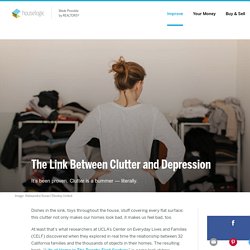
At least that’s what researchers at UCLA’s Center on Everyday Lives and Families (CELF) discovered when they explored in real time the relationship between 32 California families and the thousands of objects in their homes. The resulting book, “Life at Home in The Twenty-First Century,” is a rare look at how middle-class Americans use the space in their homes and interact with the things they accumulate over a lifetime. Our over-worked closets are overflowing with things we rarely touch. Related: Tiny Change, Big Impact: Organize a Small Closet in a Weekend (video) It turns out that clutter has a profound affect on our mood and self-esteem. A link between high cortisol (stress hormone) levels in female home owners and a high density of household objects.The more stuff, the more stress women feel.
Adopt the Rule of Five Put Photos Away. Keep Them Passionately Curious - Edwords Blog. I was once asked during a presentation for a parent’s group what it is that preschoolers need most to prepare them academically.

I’m sure some would have loved tips on building early readers or how to get a jump start on math skills (both important, to be sure), but what I really believe young children need goes beyond even those basic skills. “Honestly,” I said, “if I had to pick one thing, it would be for them to simply keep their curiosity. Everything else will follow.” Passionately Curious Albert Einstein’s name is synonymous with genius. “I have no special talents. Curiosity and creativity are often inextricably intertwined. It is commonly said that children are naturally curious. "Preschool children, on average, ask their parents about 100 question a day. Teach Your Child to Gently Work Through a Mistake With These 5 Questions - Mo...
Big or small, we all make mistakes.
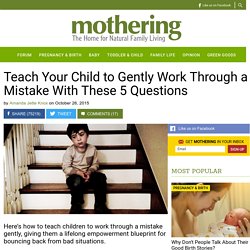
Teaching Children Kindness. One of the character traits my husband and I would like to instill in our children is kindness.
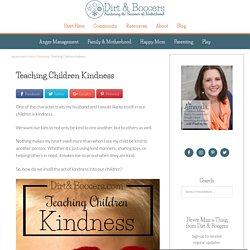
We want our kids to not only be kind to one another, but to others as well. Nothing makes my heart swell more than when I see my child be kind to another person. Whether it’s just using kind manners, sharing toys, or helping others in need, it makes me so proud when they are kind. Lyssna upp ditt barns självkänsla, istället för att prata upp den. Barn får beröm från sina första leenden, joller och steg.
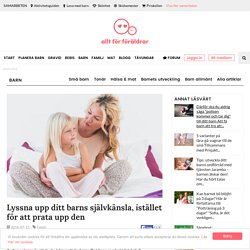
Why Some Parents & their Children have Great Friendships. Get elephant's newsletter There are many reasons why some adults get along with their kids better than others.
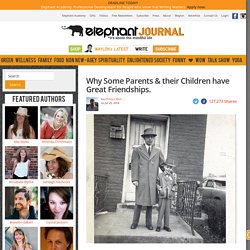
In this article, I will provide a short overview of the common explanations which have emerged whilst professionally mediating the relationship between parents and their children, as well as observations in my personal life and society in general. There are some physiological factors, genetic dispositions, and psychological factors, such as mental illness, which might be influential in developing a poor friendship between a child and their parent. How to Teach Your Kids about the Brain. When children understand what’s happening in the brain, it can be the first step to having the power to make choices.

Knowledge can be equally powerful to parents too. Knowing how the brain works means we can also understand how to respond when our children need our help. Sometimes our brains can become overwhelmed with feelings of fear, sadness or anger, and when this happens, it’s confusing—especially to children. Unlearning Adultism - Parenting for Social Change. In part one of this article, I introduced the idea that the dominant belief system in our culture around parenting is one based on adultism.
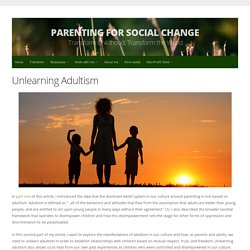
Adultism is defined as “…all of the behaviors and attitudes that flow from the assumption that adults are better than young people, and are entitled to act upon young people in many ways without their agreement.” (1) I also described the broader societal framework that operates to disempower children and how this disempowerment sets the stage for other forms of oppression and discrimination to be perpetuated. In this second part of my article, I want to explore the manifestations of adultism in our culture and how, as parents and adults, we need to unlearn adultism in order to establish relationships with children based on mutual respect, trust, and freedom. Unlearning adultism also allows us to heal from our own past experiences as children who were controlled and disempowered in our culture.
What Does Adultism Look Like? Unlearning Adultism. Adultism: The Hidden Toxin Poisoning Our Relationships with Children - Parent... As parents or parents-to-be, we commit ourselves to understanding the physical and emotional needs of children.
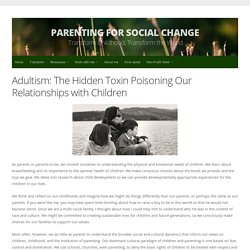
We learn about breastfeeding and its importance to the optimal health of children. Why Empathy Holds the Key to Transforming 21st Century Learning. By Thom Markham Like other aspects of modern life, education can make the head hurt.
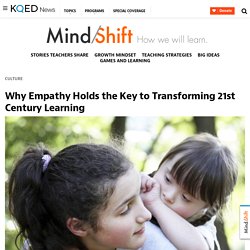
How to Stop Automatic Negative Thoughts. Five Science-Backed Strategies to Build Resilience. A mentor of mine recently passed away, and I was heartbroken—so I tried my best to avoid thinking about it. I didn’t even mention it to my family because I didn’t want those sad feelings to resurface. In other words, I took the very enlightened approach of pretend it didn’t happen—one that’s about as effective as other common responses such as get angry, push people away, blame yourself, or wallow in the pain. Even for the relatively self-aware and emotionally adept, struggles can take us by surprise.
But learning healthy ways to move through adversity—a collection of skills that researchers call resilience—can help us cope better and recover more quickly, or at least start heading in that direction. The Greater Good Science Center has collected many resilience practices on our website Greater Good in Action, alongside other research-based exercises for fostering kindness, connection, and happiness. 1. 2. In a 2010 study, researchers modeled this process in the lab. 3. M.facebook. Mine includes receiving financial aid at two schools over the course of a decade, a mother who survived premenopausal breast cancer thanks to some excellent medical care, and grandparents on my wife’s side who survived the Holocaust and were welcomed to the United States.
So tell your family history to your children, grandchildren, nieces or students. Update it each year with new examples of others who helped you out along the way. Kids love hearing these stories, and it helps them understand why you feel moved to support the causes you do. YOUR CHARITABLE PIE One of the most meaningful family conversations I can recall resulted from explaining to our older daughter how we divide our charitable budget.
To my wife and me, the list of organizations was a pretty good inventory of the things we cared about most.